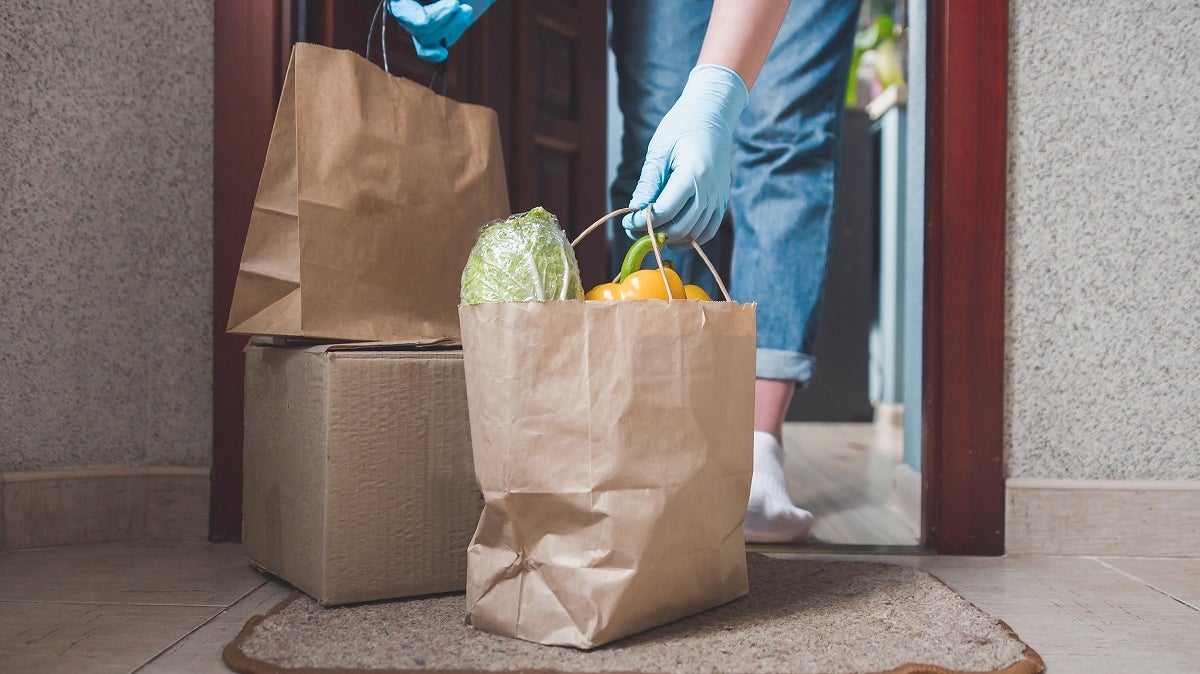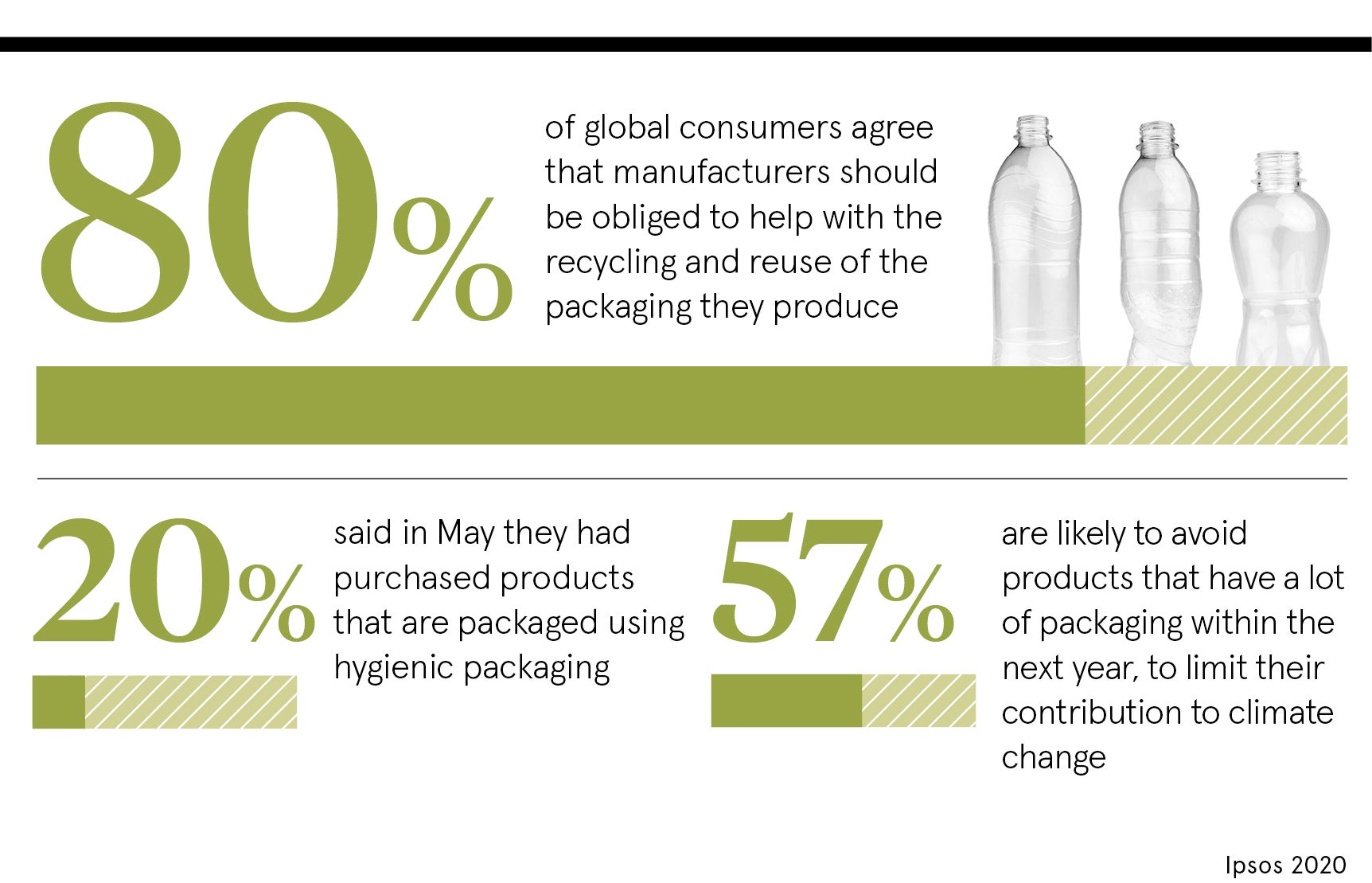
Pre-pandemic, packaging was on a roll. The global market value in 2019 was $917 billion, according to research by Smithers, with forecasts it would top the one-trillion mark by 2024.
As the climate emergency loomed large in the minds of consumers, numbers for environmentally responsible options were strong too. A YouGov survey last year found half of UK shoppers were willing to pay more for sustainable packaging.
So how has the coronavirus changed the game?
The packaging industry and COVID-19
In general, according to Nicholas Mockett, partner at Moorgate Capital, most packaging manufacturers have seen strong sales during the pandemic, which augurs well for funding and finance.
“Investors do not invest if there is no prospect of a return on investment. Fortunately for packaging, the vital role it plays in supply chains, as evidenced by the robust performance during COVID-19, suggests investor appetite will be sustained,” he says.
Inevitably, there have been winners and losers. It has been boom time for ecommerce, including the “recommerce” market for previously owned, new or used goods, plus online shopping and direct-to-consumer models. Demand for medical packaging is atypically high, for obvious reasons, plus food provision for people staying home to eat, especially takeaway meals, has seen a spike in unit sales.
All these uplifts in end-user demand bring with them opportunities for transit packaging and wholesale business happening along the supply chain.
On the downside, volumes in heavily impacted market sectors, such as air travel, tourism and hospitality, plus some high street retail, notably fashion, have sadly been hit hard.
Where then does this leave sustainable packaging? The more eco-conscious end of the general consumer market has held up surprisingly well, even advanced in some cases.
Balance the equation and control the cost
Data from more than 40,000 consumers in 23 countries, collected by global intelligence platform Streetbees, reveals 35 per cent of people worldwide have changed their sustainability habits, since the end of May, for the better.
Naturally, the question of hygiene shot up the consumer agenda, especially in the early days of lockdown when fears about the virus surviving on materials and surfaces heightened the risk factor associated with anything arriving at your door.
In response, a new logistics language emerged, explains Amelia Dales, commercial director at Garçon Wines. “Contactless delivery is now a term that has become part of our vocabulary and has allowed many who have had to self-isolate to access everyday household essentials safely.”

Sustainable packaging pioneers able to adapt to these new criteria are prospering, including Garçon Wines that has seen unprecedented demand for its contactless supply of climate and letterbox-friendly flat wine bottles.
“COVID-19 has redefined sustainability,” says Kaushal Shah, founder and chief executive of sustainable papers specialist envoPAP. Fundamentally, though, the scenario remains simple. “Consumers’ current top priorities are staying healthy and spending as little as possible. The real challenge is to deliver a truly sustainable packaging product that ticks both boxes,” adds Shah.
The evidence from waste management is also that the pandemic has forced packaging companies to speed up decisions on sustainable solutions and bolster their green credentials. But again this view carries a caveat, according to Roger Wright, waste strategy and packaging manager at Biffa.
“Hygiene and sustainability are by no means mutually exclusive; the bigger challenge for businesses will be controlling costs,” he says.
Hygiene, single-use plastics and reusable packaging
Safety and sustainability are not always an easy match though. Terms such as “single use” and “plastic” have become red-flag badges of dishonour for a Blue Planet generation of shoppers.
The fear among environmentalists is that a reactionary shift back to a more risk-averse mindset post-COVID might see more packaging, particularly plastic, not less, with the excess meaning more resource consumption, CO2 and waste, and less sustainability.
Even with single-use solutions designed to assuage hygiene concerns, however, there are still ways to level up the safety and sustainability equation a little, for instance by optimising use of recycled content, says Dales. “Companies that survive this challenging decade will manage to balance these elements sufficiently, but those that want to excel should lead from a ‘sustainability-first’ perspective to have the greatest positive impact and odds of success,” she says.
Do consumers want sustainable packaging?
Following the upheavals of lockdown, the packaging industry is also dealing with disruption of a different kind as restrictions ease. So, for instance, pubs and bars reopening have thrown up new packaging-related changes in consumer behaviour, motivated by hygiene considerations, says Adrian Curry, managing director of Encirc, a market leader in container glass.
“Our research with YouGov showed people choosing glass bottles over pint glasses. Some 60 per cent of UK adults say they’re more cautious about drinking from reusable glasses due to fears around contamination and four in ten people are more likely to choose glass-bottled beverages than before lockdown,” says Curry.
By contrast, another example of a potential trade-off between safety and sustainability sees consumers wanting coffee shops to resume serving in reusable cups, despite hygiene issues.
Furthermore, in a sign of confidence in sustainable packaging returning, TerraCycle launched its zero-waste refillable UK shopping pilot, in July, in collaboration with Tesco.
With existing operations in the United States and France, Loop had delayed its original start date due to COVID, but is now pressing ahead, with major brands, from Heinz to Nivea, signed up.
Reusables also received a significant show of support when more than 125 health experts from 19 countries signed a statement with Greenpeace USA assuring retailers and consumers such packaging is safe during COVID-19.
Ultimately, then, the message from clients is sustainability will be the number-one priority for the future of packaging, even or perhaps especially, in a post-pandemic world, says Dr Tim Breker, co-founder and managing director of reusable packaging-as-a-service pioneer VYTAL. “Reusable packaging and circular-economy models are increasing in importance. Hygiene is a given, whereas sustainability is a differentiating criterion for consumers.”

Pre-pandemic, packaging was on a roll. The global market value in 2019 was $917 billion, according to research by Smithers, with forecasts it would top the one-trillion mark by 2024.
As the climate emergency loomed large in the minds of consumers, numbers for environmentally responsible options were strong too. A YouGov survey last year found half of UK shoppers were willing to pay more for sustainable packaging.
So how has the coronavirus changed the game?
